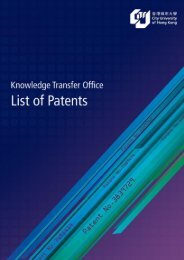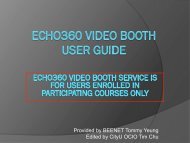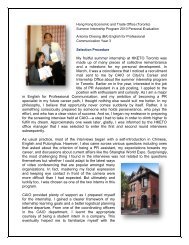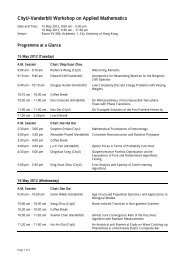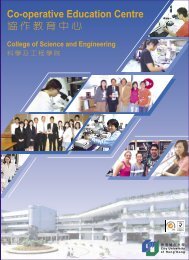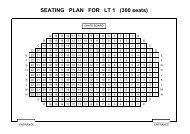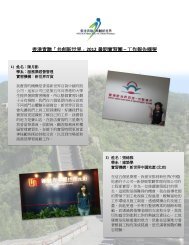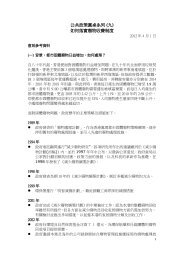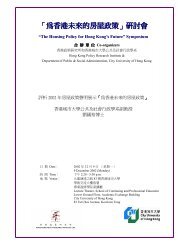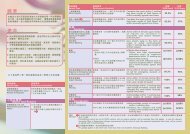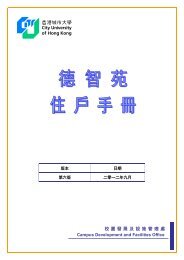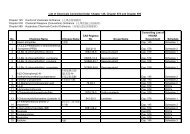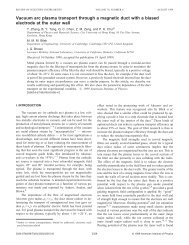Curriculum Vitae - City University of Hong Kong
Curriculum Vitae - City University of Hong Kong
Curriculum Vitae - City University of Hong Kong
You also want an ePaper? Increase the reach of your titles
YUMPU automatically turns print PDFs into web optimized ePapers that Google loves.
Personal:<br />
Education:<br />
Academic<br />
Employment:<br />
<strong>Curriculum</strong> <strong>Vitae</strong><br />
Philip J. Ivanhoe 艾文賀 Office Phone: (852) 3442 8474<br />
Dept. <strong>of</strong> Public & Social Administration Home Phone: (852) 2319 2922<br />
B7416, 7th Floor, Blue Zone (Lift 9) FAX: (852) 3442 0413<br />
Academic Building EMAIL: pivanhoe@cityu.edu.hk<br />
<strong>City</strong> <strong>University</strong> <strong>of</strong> <strong>Hong</strong> <strong>Kong</strong><br />
Kowloon, <strong>Hong</strong> <strong>Kong</strong><br />
PhD. Stanford <strong>University</strong> 1982-1987<br />
B.A. Stanford <strong>University</strong> 1972-1976<br />
Chair Pr<strong>of</strong>essor <strong>of</strong> East Asian and Comparative Philosophy and Religion<br />
Department <strong>of</strong> Public and Social Administration<br />
<strong>City</strong> <strong>University</strong> <strong>of</strong> <strong>Hong</strong> <strong>Kong</strong><br />
2012-<br />
Pr<strong>of</strong>essor <strong>of</strong> Philosophy<br />
Department <strong>of</strong> Public and Social Administration<br />
<strong>City</strong> <strong>University</strong> <strong>of</strong> <strong>Hong</strong> <strong>Kong</strong><br />
2007-2012<br />
Visiting Research Pr<strong>of</strong>essor <strong>of</strong> Philosophy<br />
Boston <strong>University</strong>, 2004-2006.<br />
John Findlay Visiting Pr<strong>of</strong>essor <strong>of</strong> Philosophy<br />
Boston <strong>University</strong>, 2003-04.<br />
Austin J. Fagothey, S. J. Distinguished Visiting<br />
Pr<strong>of</strong>essor in Philosophy, Santa Clara <strong>University</strong><br />
(Spring 2000-2001)<br />
Associate Pr<strong>of</strong>essor Departments <strong>of</strong> Asian Languages<br />
and Cultures and Philosophy, <strong>University</strong> <strong>of</strong> Michigan,<br />
Ann Arbor, 1998-2002.<br />
Associate Pr<strong>of</strong>essor Philosophy and Religious Studies<br />
Stanford <strong>University</strong>, 1996-1998. (Early Promotion)
Assistant Pr<strong>of</strong>essor Philosophy and Religious Studies<br />
Stanford <strong>University</strong>, 1991-1996<br />
Acting Asst Pr<strong>of</strong>. Asian Languages and Religious Studies<br />
Stanford <strong>University</strong>, 1989-1991<br />
Lecturer, Asian Languages and Religious Studies<br />
Stanford <strong>University</strong>, 1986-1989<br />
Pr<strong>of</strong>essional<br />
Organizations:<br />
American Academy <strong>of</strong> Religion<br />
American Philosophical Association<br />
Association for Asian Studies<br />
Society for Asian and Comparative Philosophy<br />
International Society <strong>of</strong> Chinese Philosophy<br />
International Society for Comparative Studies <strong>of</strong><br />
Chinese and Western Philosophy<br />
Journal<br />
Referee:<br />
Environmental Values<br />
Radical Philosophy Review<br />
Journal <strong>of</strong> Business Ethics<br />
International Philosophical Quarterly<br />
Journal <strong>of</strong> Chinese Philosophy<br />
The Journal <strong>of</strong> Religious Ethics<br />
The Journal <strong>of</strong> Asian Studies<br />
Journal <strong>of</strong> the American Academy <strong>of</strong> Religions<br />
Journal <strong>of</strong> International Political Theory<br />
Harvard Journal <strong>of</strong> Asiatic Studies<br />
Asia Major<br />
Song-Ming Studies<br />
Editorial and Advisory<br />
Boards:<br />
European Journal for Philosophy <strong>of</strong> Religion (Regional Editor for East Asia)<br />
Journal for Chinese Philosophy and Culture<br />
Notre Dame Philosophical Reviews<br />
Topics in Contemporary Philosophy (Book Series, MIT Press)<br />
Philosophy East and West<br />
Janus Blog: The Virtue Theory Discussion Forum<br />
International Encyclopedia <strong>of</strong> Ethics<br />
Journal <strong>of</strong> Daoist Studies
Representative Major<br />
Academic Service:<br />
Selected Invited<br />
Lectures:<br />
National Taiwan <strong>University</strong> Philosophical Review<br />
Director, Center for East Asian and Comparative Philosophy (CEACOP)<br />
http://www6.cityu.edu.hk/sa/ceacop/ (2013-present)<br />
Project Director, Korean Philosophy in Comparative Perspectives<br />
http://www6.cityu.edu.hk/sa/kpcp/index.htm (2012-present)<br />
Departmental Research Coordinator (2012-present)<br />
Member, <strong>University</strong> Appeals Committee (2010-present)<br />
Member Search Group for Appointment for Head <strong>of</strong> Department (2010-12)<br />
Member, Performance-based Pay Review Committee (2010-present)<br />
Member, <strong>University</strong> Space Allocation Committee (2009-11)<br />
Director, Applied Ethics Stream, SA (2009-2010)<br />
Member, Committee on Applied Research (2008-present)<br />
Member, Distinguished Speakers Committee (2008-present)<br />
Member, Departmental Staffing Committee, SA (2008-2010)<br />
Member, Departmental Executive Committee, SA (2007-09)<br />
Member Executive Committee, Asian Languages and Cultures (2001-02)<br />
Director, Korean Studies Program (July 2000-02)<br />
Chair, Graduate Admissions Committee, Philosophy (1999-2000)<br />
“The Historical Significance and Contemporary Relevance <strong>of</strong> the Four-Seven<br />
Debate,” Invited talk at Boston <strong>University</strong>, 4 April 2012<br />
“The Values <strong>of</strong> Oneness,” Invited talk at Boston College, 2 April 2012<br />
“<strong>Kong</strong>zi and Aristotle as Virtue Ethicists,” Keynote Address at the<br />
Second International Fu Jen Academia Catholica Conference on<br />
“Interdisciplinary Dialogue on Man, Culture, and Transcendence,”<br />
Fu Jen Catholic <strong>University</strong>, Taipei, Taiwan, 13-14 May 2011.<br />
“Virtue Ethics and the Confucian Tradition,” Keynote Address at<br />
the International Conference on Confucianism and Virtue Ethics,<br />
Beijing <strong>University</strong>, Beijing, China 14-16 May 2010.<br />
“The Contemporary Significance <strong>of</strong> Confucian Views about the<br />
Ethical Values <strong>of</strong> Music,” Keynote Address at the 16 th Conference<br />
<strong>of</strong> the International Society for Chinese Philosophy, Fu Jen Catholic<br />
<strong>University</strong>, Taipei, Taiwan, 9 July 2009.
“Lessons from the Past: Zhang Xuecheng and the Ethical Dimensions<br />
<strong>of</strong> History,” Semrad Endowed Lecture in Non-Western Thought,<br />
Creighton <strong>University</strong>, 7 October 2008<br />
“A Confucian Contribution to Justice, Gender, and the Family,”<br />
Plenary Talk for the Conference Confucian Virtues at Work,<br />
<strong>University</strong> <strong>of</strong> Oregon, 3 March 2008.<br />
“The Values <strong>of</strong> Spontaneity,” John Findlay Lecture, Boston<br />
<strong>University</strong>, 15 February 2004<br />
“Filial Piety as a Virtue,” Mike Ryan Lecture Series, Kennesaw<br />
State <strong>University</strong>, 13 October 2003<br />
The Persistence <strong>of</strong> Humanity and the Relevance <strong>of</strong> Confucius,”<br />
Kwan-wai So/Anthony Koo Lecture, Michigan State <strong>University</strong>,<br />
10 March 2003<br />
“Death and Dying in Early Chinese Philosophy,” Lecture and<br />
Presentation for NEH Faculty Seminar “Death, Grief, and Mourning<br />
in East Asian Cultures,” College <strong>of</strong> DuPage, 17 January 2003<br />
“Filial Piety as a Virtue,” Frank Fraser Potter Memorial Lecture,<br />
Washington State <strong>University</strong>, 12 September 2002<br />
“The Changing Face <strong>of</strong> Virtue: Ethics in Early China,” Inaugural<br />
Symposium, <strong>University</strong> <strong>of</strong> Pennsylvania, Center for Ancient Studies,<br />
18 April 1998.<br />
"Self-Cultivation in Early Confucianism,” Francis Seaman Visiting<br />
Scholar Lecture Series, Philosophy Department, <strong>University</strong> <strong>of</strong> Idaho,<br />
26 April 1996<br />
“Early Confucian Self-Cultivation Part I: The Historical Context and<br />
Confucius’ Contribution,” and “Early Confucian Self-Cultivation Part<br />
II: Mencius on Human Nature and Cultivation,” (Both papers presented<br />
at the Institute for Research on the History <strong>of</strong> Chinese Thought and<br />
Culture, Tsing Hua <strong>University</strong>, 14 & 19 December 1995.)<br />
“Early Chinese Confucianism and Daoism,” Convocation and Seminar,<br />
Butler <strong>University</strong>, 13-14 October 1994<br />
“Confucianism and Contemporary Western Ethics,” The 8th International<br />
Conference on Korean Studies, The Academy <strong>of</strong> Korean Studies,<br />
Songnamsi, Korea, 23 June 1994
Special Seminars:<br />
Videotaped<br />
Lectures:<br />
“Confucian Moral Self-Cultivation,” Rockwell Lectures, Rice <strong>University</strong>,<br />
17-19 March1992<br />
“Zhuangzi and the Ineffable Dao,” Main Hall Lecture, Lawrence <strong>University</strong>,<br />
1 March1990<br />
Virtue Ethics, Moral Qualities, and Connoisseurship: An<br />
intensive four-day seminar, consisting <strong>of</strong> eight lectures and<br />
discussion sections, presented to the graduate students and<br />
faculty <strong>of</strong> the Philosophy Department <strong>of</strong> Qinghua <strong>University</strong>,<br />
26-29 October 2009. (One <strong>of</strong> the inaugural events in Qinghua’s<br />
newly established 海外学者短期讲学计划).<br />
Spontaneity, Virtue, Happiness, and Oneness: A four-day<br />
seminar, consisting <strong>of</strong> four lectures and discussion sections,<br />
presented to the graduate students and faculty <strong>of</strong> the Philosophy<br />
Department <strong>of</strong> National Taiwan <strong>University</strong> (國立臺灣大學),<br />
25-28 October 2010.<br />
“Philosophical Views <strong>of</strong> Friendship,”<br />
Stanford Homecoming Week Alumni Lecture<br />
13 October 1995<br />
Stanford Summer Alumni College<br />
“Good and Evil,” 2-8 August 1993<br />
“Confucianism: The Social as Sacred,”<br />
1991 Stanford Alumni Association Series<br />
Legacies and Visions <strong>of</strong> East Asian Cultures<br />
Radio and Television<br />
Interviews:<br />
Interview by Vanessa Collingridge, “Confucius and Confucianism,”<br />
in the series Insight <strong>of</strong> RTHK Radio 3 (Radio Television <strong>Hong</strong> <strong>Kong</strong><br />
香港電台), 3 December 2011.<br />
Interview by Rachel Hohn, “The Moral Teachings <strong>of</strong> the<br />
Analects,” for the series The Spirit <strong>of</strong> Things. ABC Radio<br />
National, (Australia's national public broadcaster), 19 June 2006.
Interview by HAN Chang-rok, “Chinese Philosophy and<br />
East Asian Cultures,” for KBS television (Korean Broadcasting<br />
System), 27 June 2006.<br />
Recent International Conferences Organized:<br />
Prefaces:<br />
Translations:<br />
Confucianism: A Habit <strong>of</strong> the Heart. (With KIM Sungmoon). 13-14<br />
December 2011, <strong>City</strong> <strong>University</strong> <strong>of</strong> <strong>Hong</strong> <strong>Kong</strong>. Sponsored by<br />
matching funds from the <strong>Hong</strong> <strong>Kong</strong> government for the Chiang<br />
Ching-kuo Foundation grant mentioned below. Held in conjunction<br />
with the <strong>University</strong> Distinguished Lecture by Pr<strong>of</strong>essor Robert Bellah,<br />
whom I nominated.<br />
Confucian and Liberal Perspectives on Family, State, and Civil<br />
Society. (With KIM Sungmoon). 6-7 December 2010, <strong>City</strong><br />
<strong>University</strong> <strong>of</strong> <strong>Hong</strong> <strong>Kong</strong>. Sponsored by a grant from the Chiang<br />
Ching-kuo Foundation for International Scholarly Exchange.<br />
Applied Ethics From a Confucian Point <strong>of</strong> View. (With Fan Ruiping).<br />
4-5 January 2008, <strong>City</strong> <strong>University</strong> <strong>of</strong> <strong>Hong</strong> <strong>Kong</strong>. Sponsored by the<br />
Department <strong>of</strong> Public and Social Administration and the Governance<br />
in Asia Resource Centre.<br />
Introductory Remarks to Femininity and Feminism: Chinese<br />
and Contemporary, Special Issue <strong>of</strong> the Journal <strong>of</strong> Chinese<br />
Philosophy, 36.2 (June, 2009).<br />
Philosophy in Contemporary China: New Opportunities<br />
for East-West Dialogue, Rong Rong Wang, ed. (Albany<br />
NY: SUNY Press, 2004).<br />
Korea’s Challenge to Neo-Confucian Orthodoxy:<br />
The Philosophy <strong>of</strong> Chong Yagyong by Mark Setton,<br />
(Albany: SUNY Press, 1998).<br />
“Cheng Hao and Cheng Yi (Selections)” in Readings<br />
in Later Chinese Philosophy: Han to the Present, Edited<br />
by Bryan W. Van Norden and Justing Tiwald, (Indianapolis<br />
IN: Hackett Publishing Company, forthcoming) 45 ms. pages.<br />
Master Sun’s Art <strong>of</strong> War. (See “Books” below.)<br />
The Essays and Letters <strong>of</strong> Zhang Xuecheng (1738-1801).
Reviews and Responses:<br />
Ms. (See “Books” below.)<br />
Mencius. (See “Books” below.)<br />
Readings from the Lu-Wang School. (See “Books”<br />
below.)<br />
The Daodejing, complete translation with notes for<br />
Readings in Classical Chinese Philosophy. Published<br />
in revised form with Introduction and Language Appendix<br />
as The Laozi or Daodejing. (See “Books” below).<br />
The Mozi, selected translation with notes for Readings in<br />
Classical Chinese Philosophy. (See “Books” below).<br />
老子における存在論的観点からの哲学的分析<br />
“A Philosophical Analysis <strong>of</strong> the Laozi from an Ontological<br />
Perspective,” by Tateno Masami, (translated from Japanese)<br />
in Essays on Religious and Philosophical Aspects <strong>of</strong> the Laozi.<br />
(See “Books” below).<br />
Response to LEE Jung (with Karen L. Carr) in Dao: A Journal<br />
<strong>of</strong> Comparative Philosophy, 10.2 (March, 2011): 251-2.<br />
Neo-Confucianism in History, Bol, Peter K. (Cambridge, MA:<br />
Harvard <strong>University</strong> Press, 2008) in Dao: A Journal <strong>of</strong><br />
Comparative Philosophy, 9.4 (Winter, 2010): 471-5.<br />
In Praise <strong>of</strong> Blandness: Proceeding from Chinese Thought and<br />
Aesthetics, Francois Jullien, (New York: Zone Books, 2004) in<br />
Dao: A Journal <strong>of</strong> Comparative Philosophy, 7.3 (Fall, 2008): 335-8.<br />
The Philosophy <strong>of</strong> the Daodejing, Hans-Georg, Moeller<br />
(New York: Columbia <strong>University</strong> Press, 2006) in Dao:<br />
A Journal <strong>of</strong> Comparative Philosophy, 6.3 (Fall, 2007): 310-3.<br />
Confucian Ethics, Kwong-loi Shun and David Wong,<br />
ed., (Cambridge <strong>University</strong> Press, 2004) in Ethics 117.1<br />
(October, 2006): 156-9.<br />
Mencius: Contexts and Interpretations, Alan K. L. Chan, ed.,<br />
in Journal <strong>of</strong> Chinese Religions, 31 (2003): 215-6.
Review<br />
Articles:<br />
Cheng-Zhu Confucianism in the Early Qing: Li Guangdi<br />
(1642-1718 and Qing Learning, On-cho Ng, in The Journal<br />
<strong>of</strong> Chinese Philosophy, 29.4 (December, 2002): 574-9.<br />
The Analects <strong>of</strong> Confucius, Chichung Huang, tr., in<br />
Journal <strong>of</strong> Chinese Religions, (Winter, 1999): 162-63.<br />
Mencius and Early Chinese Thought, Kwong-loi Shun, in<br />
The Journal <strong>of</strong> Asian Studies, 57.3 (1998): 838-839.<br />
The Ways <strong>of</strong> Confucianism, David S. Nivison, in<br />
International Philosophical Quarterly, 38.1.149<br />
(March, 1998): 98-100.<br />
Confucius: The Analects, Raymond Dawson. tr., in<br />
Journal <strong>of</strong> Chinese Religions, (Fall 1995): 181-84.<br />
The Confucian Creation <strong>of</strong> Heaven: Philosophy<br />
and the Defense <strong>of</strong> Ritual Mastery, Robert Eno, in<br />
The Journal <strong>of</strong> Asian Studies, 50.4 (November,<br />
1991): 907-908.<br />
Worldly Wisdom: Confucian Teachings <strong>of</strong> the<br />
Ming Dynasty, J. C. Cleary, tr., and ed., in Journal<br />
<strong>of</strong> Chinese Religions, (Fall, 1991): 133-135.<br />
Man and Nature in the Philosophical Thought<br />
<strong>of</strong> Wang Fu-chih, Alison H. Black, in The Journal<br />
<strong>of</strong> Chinese Religions, 1, (Fall, 1990): 193-195.<br />
The Dysfunction <strong>of</strong> Ritual in Early Confucianism,<br />
by Michael David Kaulana Ing, Review article,<br />
China Review International, 20 ms. pages.<br />
Humanism in East Asian Confucian Contexts, by<br />
Huang Chun-chieh, Review article, Taiwan Journal<br />
<strong>of</strong> East Asian Studies, 臺灣東亞文明研究學刊 8.1<br />
(June, 2011): 337-54.<br />
Interpreting the Mengzi, review <strong>of</strong> Mencius: Contexts<br />
and Interpretations, Alan K. L. Chan, ed., Feature<br />
Book Review, Philosophy East and West, 54.2<br />
(April 2004): 257-71.
The Shifting Contours <strong>of</strong> the Confucian Tradition,<br />
review <strong>of</strong> Imagining Boundaries: Changing Confucian<br />
Doctrines, Texts, and Hermeneutics, Kai-wing Chow,<br />
On-cho Ng, and John Henderson, eds., Feature Book<br />
Review, Philosophy East and West, 54.1<br />
(January 2004): 83-94.<br />
Unreason Within Reason: Essays on the Outskirts <strong>of</strong><br />
Rationality, Angus C. Graham, China Review International,<br />
1.1 (Spring, 1994): 107-123.<br />
Thinking Through Confucius, David L. Hall and Roger T.<br />
Ames, Feature Book Review, Philosophy East and West,<br />
41.2 (April, 1991): 241-254.<br />
“One View <strong>of</strong> the Language-Thought Debate: A Review <strong>of</strong><br />
Language and Logic in Ancient China, ”Chad Hansen,<br />
Feature Book Review, Chinese Literature, Essays,<br />
Articles and Reviews (CLEAR) 9 (1987): 115-123.<br />
Articles and Book<br />
Chapters:<br />
“New Old Foundations for Confucian Ethical Philosophy: Itō<br />
Jinsai 伊藤 仁斎 (1627 –1705), Dai Zhen (戴震) (1722-1776),<br />
and Jeong Yakyong (丁若鏞 ) (1762–1836),” Under review at<br />
Taiwan Journal <strong>of</strong> East Asian Studies.<br />
“A Confucian Contribution to Justice, Gender, and the Family,”<br />
Under review at Sophia.<br />
“The ‘Corporate’ Nature <strong>of</strong> Confucianism and Its Implications for<br />
Business Ethics,” Under review at the Journal <strong>of</strong> Business Ethics.<br />
“The Nature and Possibility <strong>of</strong> Historical Understanding,” Under<br />
review at the Journal <strong>of</strong> the Philosophy <strong>of</strong> History.<br />
“The Historical Significance and Contemporary Relevance <strong>of</strong> the<br />
Four-Seven Debate.” Forthcoming in Philosophy East and West,<br />
65:4 (October 2015).<br />
“Morality as an Artifact: The Nature <strong>of</strong> Moral Norms in Xunzi’s<br />
Philosophy,” in Justin Tiwald, ed., Oxford Handbook <strong>of</strong> Chinese<br />
Philosophy, (New York: Oxford <strong>University</strong> Press, Forthcoming 2014).
“Confucian Cosmopolitanism,” Accepted for Publication by the<br />
Journal <strong>of</strong> Religious Ethics, (Forthcoming, 2014).<br />
“<strong>Kong</strong>zi and Aristotle as Virtue Ethicists” in Li Chenyang and<br />
Ni Peimin, eds., “Moral Cultivation and Confucian Virtues:<br />
Engaging Joel J. Kupperman,” (SUNY Press, Forthcoming, 2014).<br />
“Senses and Values <strong>of</strong> Oneness,” in Brian Bruya, ed., The<br />
Philosophical Challenge from China, (Cambridge, MA: MIT<br />
Press, Forthcoming, 2014).<br />
“Freud and the Dao” in The Reception and Rendition <strong>of</strong> Freud in<br />
China: China’s Freudian Slip, (Routledge and Kegan Paul): 196-218.<br />
(See “books” below.)<br />
“Virtue Ethics and the Confucian Tradition,” in Daniel Russell,<br />
ed., Cambridge Companion to Virtue Ethics, (Cambridge:<br />
Cambridge <strong>University</strong> Press, 2013): 49-69.<br />
*Longer version to appear in Stephen C. Angle and Michael Slote, eds.,<br />
Virtue Ethics and Confucianism (New York and London: Routledge,<br />
2013): 28-46.<br />
“Happiness in Early Chinese Thought,” in Ilona Boniwell and<br />
Susan David, eds., Oxford Handbook <strong>of</strong> Happiness, (Oxford<br />
<strong>University</strong> Press, 2013): 263-78.<br />
“Understanding Traditional Chinese Philosophical Texts,”<br />
International Philosophical Quarterly, 52.3 (Sept. 2012): 303-14.<br />
“Moral Perception in McDowell, Wang, and Mengzi,” Dao: A<br />
Journal <strong>of</strong> Comparative Philosophy, 10.3 (2011): 273-90.<br />
“Hanfeizi and Moral Self Cultivation” in Legalist Philosophy <strong>of</strong><br />
Han Fei Special Theme issue <strong>of</strong> the Journal <strong>of</strong> Chinese Philosophy,<br />
38.1 (March 2011): 49-63.<br />
“Moral Tradition Respect,” in Chris Fraser, Dan Robins, and<br />
Timothy O’Leary, eds., Ethics in Early China, (<strong>Hong</strong> <strong>Kong</strong>:<br />
<strong>University</strong> <strong>of</strong> <strong>Hong</strong> <strong>Kong</strong> Press, 2010): 133-44.<br />
“Lu Xiangshan’s Ethical Philosophy” in Dao Companion<br />
to Neo-Confucian Philosophy, John Makeham, ed., (New
York: Springer-Verlag, 2010): 249-66.<br />
“Of Geese and Eggs: In What Sense Should We Value Nature<br />
as a System?” Environmental Ethics, 32 (Spring, 2010): 67-78.<br />
“The Values <strong>of</strong> Spontaneity,” in Taking Confucian<br />
Ethics Seriously: Contemporary Theories and Applications,<br />
Yu Kam-por, Julia Tao, and Philip J. Ivanhoe, eds. (Albany,<br />
NY: SUNY Press, 2010): 183-207.<br />
“The Theory and Practice <strong>of</strong> Abortion from a Confucian<br />
Perspective,” in Applied Ethics from a Confucian Point <strong>of</strong><br />
View a Special Issue <strong>of</strong> Dao: A Journal <strong>of</strong> Comparative<br />
Philosophy 9.1 (Spring, 2010): 37-51.<br />
“The Contemporary Significance <strong>of</strong> Confucian Views about<br />
the Ethical Values <strong>of</strong> Music,” in 2009 Civilization and Peace,<br />
(Seoul, Edison, N.J.: Jimoondang, 2010): 123-133.<br />
“Pluralism, Toleration, and Ethical Promiscuity,” The Journal<br />
<strong>of</strong> Religious Ethics, 37.2 (June, 2009): 311-29.<br />
“Lessons from the Past: Zhang Xuecheng and the Ethical<br />
Dimensions <strong>of</strong> History,” Dao: A Journal <strong>of</strong> Comparative<br />
Philosophy, 8.2, (June, 2009): 189-203.<br />
*Chinese translation in 中国儒学, 4.1, (2009): 383-404.<br />
“Philosophical Approaches to Nature,” co-authored with<br />
John H. Zammito, Helen Longino, and Phillip R. Sloan, in<br />
B. Andrew Lustig, Baruch A. Brody, Gerald P. McKenny,<br />
eds., Altering Nature, Volume I, (Dordrecht: Springer, 2008).<br />
“The Theme <strong>of</strong> Unselfconsciousness in the Liezi” in Ronnie<br />
Littlejohn and Jeffrey Dippmann, eds., Riding the Wind with<br />
Liezi: New Essays on the Daoist Classic, (Albany, NY: SUNY<br />
Press, forthcoming 2008): 129-152.<br />
“The ‘Golden Rule’ in the Analects” in Confucius Now:<br />
Contemporary Encounters with the Analects, David Jones,<br />
ed., (LaSalle, IL: Open Court Press, 2008): 81-107.<br />
“The Paradox <strong>of</strong> Wuwei?” The Journal <strong>of</strong> Chinese<br />
Philosophy. 34.2 (June, 2007): 277-87.
“Heaven as a Source for Ethical Warrant in Early Confucianism,”<br />
Dao: A Journal <strong>of</strong> Comparative Philosophy, 6.3 (2007): 211-20.<br />
“Literature and Ethics in the Chinese Confucian Tradition,”<br />
in Brad Wilburn, ed., Moral Cultivation, (Lanham, MD: Rowan<br />
and Littlefield, 2007): 29-48.<br />
“The Shade <strong>of</strong> Confucius: Social Roles, Ethical Theory,<br />
and the Self,” in Ronnie L. Littlejohn and Marthe Chandler, eds.,<br />
Polishing the Chinese Mirror: Essays in Honor <strong>of</strong> Henry Rosemont,<br />
Jr. (New York: Global Scholarly Publications, 2007): 41-56.<br />
“Intellectual Property and Traditional Chinese Culture,”<br />
in Topics in Contemporary Philosophy, Volume 3, Law and<br />
Social Justice, Joseph Keim Campbell, Michael O’Rourke,<br />
and David Shier, eds., (Cambridge, MA: MIT Press, 2005):125-42.<br />
“Filial Piety as a Virtue,” in Filial Piety in Chinese Thought<br />
and History, Alan K. L. Chan, ed., (London: Routledge Curzon<br />
Press, 2004): 189-202.*<br />
*Revised version reprinted on pages 297-312 <strong>of</strong> Working Virtue:<br />
Virtue Ethics and Contemporary Moral Problems. (See “Books”<br />
below.)<br />
“Comments on Julia Ching’s Essay, ‘The Chinese Cultural<br />
Tradition (Confucianism) and Weapons <strong>of</strong> Mass Destruction,’”<br />
in Sohail Hashmi, ed., Ethics and Weapons <strong>of</strong> Mass Destruction:<br />
Religious and Secular Perspectives, (Cambridge, Cambridge<br />
<strong>University</strong> Press, 2004): 270-6.<br />
“Death and Dying in the Analects,” in Confucian Spirituality<br />
Mary Evelyn Tucker and Tu Weiming ed., (New York,<br />
Crossroad Press, 2004): 220-32.*<br />
*Revised version reprinted on pages 137-51 <strong>of</strong> Mortality and<br />
Traditional China. (See “Books” below.)<br />
“The Virtue <strong>of</strong> Courage in the Mencius,” in Barbara Darling-<br />
Smith, ed., Studies in Courage, (Notre Dame, IN: Notre Dame<br />
<strong>University</strong> Press, 2002): 65-79.*<br />
*Revised version entitled “Mengzi’s Conception <strong>of</strong> Courage”<br />
reprinted in special issue <strong>of</strong> Dao: A Journal <strong>of</strong> Comparative<br />
Philosophy, edited by Xiao Yang, 5.2 (June, 2006): 221-34.
“Chinese Self Cultivation and Mengzi’s Notion <strong>of</strong> Extension,”<br />
in Essays on Mencius’ Moral Philosophy, (See “Books” below).<br />
“Mengzi, Xunzi and Modern Feminist Ethics,” in Chenyang Li, ed.,<br />
The Sage and the Second Sex: Confucianism, Ethics and Gender<br />
(Chicago: IL: Open Court Publishing Company, 2000): 57-74.<br />
“Whose Confucius? Which Analects? Diversity in the<br />
Confucian Commentarial Tradition,” in Essays on the<br />
Analects <strong>of</strong> Confucius, Bryan W. Van Norden, ed.,<br />
(New York: Oxford <strong>University</strong> Press, 2002): 119-33.<br />
“Daoism,” Essay on ethical views in the Daodejing<br />
with selective translation <strong>of</strong> passages from the text<br />
in Living Well, ed., Steven Luper (Fort Worth, TX:<br />
Harcourt Brace and Company, 2000): 80-90.<br />
“Response to Damien Keown,” Journal <strong>of</strong> Religious Ethics,<br />
25.2 (Fall, 1997): 397-400.<br />
“Early Confucianism and Environmental Ethics,” in<br />
Confucianism and Ecology: The Interrelation <strong>of</strong> Heaven,<br />
Earth, and Humans, Mary Evelyn Tucker and John Berthrong,<br />
eds. (Cambridge, MA: Harvard <strong>University</strong> Press, 1998): 59-76.*<br />
*Chinese translation reprinted in: Zhang Qizhi and Xie<br />
Yangju, eds., The Frontiers <strong>of</strong> Environmetnal Philosophy,<br />
Vol 1, (Xi’an: Shaanxi People’s Publishing House, 2004).<br />
“The Concept <strong>of</strong> De (‘Virtue’) in the Laozi,” in Religious and<br />
Philosophical Aspects <strong>of</strong> the Laozi, (SUNY Press, 1999):<br />
239-257. (See “Books” below.)<br />
“Nature, Awe, and the Sublime,” Midwest Studies in Philosophy,<br />
Volume 21, "The Philosophy <strong>of</strong> Religion," (Notre Dame, IN:<br />
<strong>University</strong> <strong>of</strong> Notre Dame Press, 1998): 98-117<br />
早期儒家的修養,第一部分:歷史背景和孔子的貢獻<br />
“Early Confucian Self-Cultivation Part I: The Historical Context<br />
and Confucius’ Contribution,” and<br />
早期儒家的修養,第二部分:孟子論人性與修養<br />
“Early Confucian Self-Cultivation Part II: Mencius on<br />
Human Nature and Cultivation,” Tsing Hua Studies in
Chinese Intellectual-Cultural History, (Taiwan: Shinchu,<br />
1999). (Tsing Hua <strong>University</strong> Lecture Series published<br />
English and Chinese versions <strong>of</strong> each lecture.)<br />
“Human Beings and Nature in Traditional Chinese Thought,”<br />
in A Companion to World Philosophies, Eliot Deutsch and<br />
Ronald Bontekoe, ed., (Oxford: Blackwell Publishers,<br />
1997): 155-164.<br />
“Was Zhuangzi a Relativist?” in Essays on Skepticism,<br />
Relativism and Ethics in the Zhuangzi, (Albany, NY:<br />
SUNY Press, 1996): 196-214.<br />
“The Metaphysical Foundations <strong>of</strong> Neo- and New<br />
Confucianism,” The Journal <strong>of</strong> Chinese Philosophy,<br />
22 (March, 1995): 81-89.<br />
“Existentialism in the School <strong>of</strong> Wang Yangming,”<br />
in Chinese Language, Thought and Culture,<br />
(LaSalle, IL: Open Court Press, 1996): 250-264.<br />
“Confucianism and Contemporary Western Ethics,”<br />
in The Universal and Particular Natures <strong>of</strong><br />
Confucianism, Lee Hyun-jae, ed. (Seoul: Yong<br />
Jin-sa, 1994): 165-183.<br />
“Human Nature and Moral Understanding in Xunzi,”<br />
International Philosophical Quarterly, 34.2.134<br />
(June, 1994): 167-175.*<br />
*Revised version reprinted in Virtue, Nature and<br />
Agency in the Xunzi, (See “Books” below.)<br />
“Zhuangzi on Skepticism, Skill, and the Ineffable Dao,”<br />
Journal <strong>of</strong> the American Academy <strong>of</strong> Religion, 61.4<br />
(Winter, 1993): 639-654.<br />
“Zhuangzi’s Conversion Experience,” The Journal <strong>of</strong><br />
Chinese Religions, 19 (Fall, 1991): 13-25.<br />
“A Happy Symmetry: Xunzi’s Ethical Thought,”<br />
Journal <strong>of</strong> the American Academy <strong>of</strong> Religion, 59.2<br />
(Summer, 1991): 309-322.*<br />
*Revised version to be reprinted in Justin Tiwald and
Dictionaries and<br />
Encyclopedia:<br />
T. C. Kline, III, ed., Ritual and Religion in the Xunzi,<br />
(Albany, NY: SUNY Press, Forthcoming 2014): XXX.<br />
“Character Consequentialsim: An Early Confucian<br />
Contribution to Contemporary Ethical Theory,”<br />
The Journal <strong>of</strong> Religious Ethics, 19.1 (Spring,<br />
1991): 55-70<br />
“Thinking and Learning in Early Confucianism,”<br />
The Journal <strong>of</strong> Chinese Philosophy, 17.4<br />
(December, 1990): 473-493.<br />
“Reweaving the ‘one thread’ <strong>of</strong> the Analects,”<br />
Philosophy East and West, 40.1 (January,1990):<br />
17-33.<br />
“A Question <strong>of</strong> Faith: A New Interpretation <strong>of</strong><br />
Mencius 2B.13,” Early China, 13 (1988): 153-165.<br />
“Reflections on the Chin-ssu lu,” Journal <strong>of</strong> the<br />
American Oriental Society, 108.2 (April-June,<br />
1988): 269-275.<br />
“Wang Yangming” in International Encyclopedia <strong>of</strong> Ethics,<br />
Hugh Lafollette, ed., (Malden, MA: Wiley-Blackwell<br />
Publishers, forthcoming 2013)<br />
“Mencius” in The Encyclopedia <strong>of</strong> Religion, Second<br />
Edition, Lindsay Jones, ed., (New York: Macmillan<br />
Press, 2005).<br />
“Origins <strong>of</strong> Chinese Ethics,” in The Blackwell<br />
Companion to Religious Ethics, William Schweicker,<br />
ed., (Oxford: Blackwell Publishers, 2005): 374-80.<br />
The following twenty entries in The Cambridge<br />
Dictionary <strong>of</strong> Philosophy, Robert Audi, ed.,<br />
(Cambridge: Cambridge <strong>University</strong> Press, 1995):<br />
Chang Hsüeh-ch’eng, Chang Tsai, Ch’eng Hao<br />
and Ch’eng Yi, ch’i, (“ether”), ching (“reverence”),<br />
Chou Tun-yi, hsin (“trust”), hsü (“the tenuous”),
Huang-Lao, I-Ching, Kuo Hsiang, li (“pattern”),<br />
Shao Yung, shen (“spirit”), Tai Chen, Taoism, tzu-jan<br />
(“spontaneity”), Wang Pi, Wang Fu-chih, Yen Yüan.<br />
The following three main entries in the Routledge<br />
Encyclopedia <strong>of</strong> Philosophy, (Routledge Press, 1999):<br />
“Chinese Neo-Confucian Philosophy.”<br />
“Mohist Philosophy.”<br />
“Chinese Philosophy <strong>of</strong> History.”<br />
The following four short entries in the same work:<br />
cheng (“authenticity”).<br />
li (“pattern”).<br />
xin (“trust”).<br />
ti-yong (“substance-function”).<br />
Journal Supplements/Special Editions:<br />
Books:<br />
Confucian and Liberal Perspectives on Family, State,<br />
and Civil Society, Guest Editor with KIM Sungmoon <strong>of</strong><br />
Special Edition <strong>of</strong> Dao: A Journal <strong>of</strong> Comparative Philosophy<br />
11.3 (September, 2012).<br />
Applied Ethics from a Confucian Point <strong>of</strong> View,<br />
Guest Editor with FAN Ruiping <strong>of</strong> Special Edition<br />
<strong>of</strong> Dao: A Journal <strong>of</strong> Comparative Philosophy 9.1<br />
(Spring, 2010).<br />
Confucianism: A Habit <strong>of</strong> the Heart, co-editor with Sungmoon<br />
Kim. Manuscript complete, proposal under review.<br />
Confucian Reflections: Ancient Wisdom for Modern Times,<br />
Under Contract with Routledge and Kegan Paul.<br />
The Reception and Rendition <strong>of</strong> Freud in China: China’s<br />
Freudian Slip, co-editor with Tao Jiang. (London: Routledge<br />
and Kegan Paul, 2012.)<br />
Mortality and Traditional China, co-editor with Amy<br />
L. Olberding. (Albany, NY: SUNY Press, 2011).<br />
Master Sun’s Art <strong>of</strong> War, translated with Introduction
and notes, (Indianapolis, IN: Hackett Publishing Company,<br />
2011).<br />
Taking Confucian Ethics Seriously: Contemporary Theories<br />
and Applications, co-editor with YU Kam-por and Julia TAO.<br />
(Albany, NY: SUNY Press, 2010).<br />
The Essays and Letters <strong>of</strong> Zhang Xuecheng (1738-1801).<br />
(Stanford, CA: Stanford <strong>University</strong> Press, 2009).<br />
Mencius, translated by Irene T. Bloom, Edited and<br />
with an Introduction by Philip J. Ivanhoe, (New York:<br />
Columbia <strong>University</strong> Press, 2009).<br />
Readings from the Lu-Wang School. (Indianapolis, IN:<br />
Hackett Publishing Company, 2009).<br />
Working Virtue: Virtue Ethics and Contemporary Moral<br />
Problems, co-editor with Rebecca Walker, (Oxford<br />
<strong>University</strong> Press, 2007).<br />
Readings in Classical Chinese Philosophy, co-editor and<br />
co-translator with Bryan W. Van Norden, Second Edition.<br />
(Indianapolis, IN: Hackett Publishing Company, 2005).<br />
The Laozi or Daodejing. Reprint. (Indianapolis, IN:<br />
Hackett Publishing Company, 2003).<br />
Essays on Mencius’ Moral Philosophy, co-editor with<br />
LIU Xiusheng, (Indianapolis, IN: Hackett Publishing<br />
Company, 2002).<br />
Ethics in the Confucian Tradition: The Thought<br />
<strong>of</strong> Mengzi and Wang Yangming, revised and<br />
expanded second edition (see below) (Indianapolis,<br />
IN: Hackett Publishing Company, 2002).<br />
Virtue, Nature and Agency in the Xunzi, co-editor with<br />
T. C. Kline III, (Indianapolis, IN: Hackett Publishing<br />
Company, 2000).<br />
Confucian Moral Self Cultivation, revised and<br />
expanded second edition <strong>of</strong> the work by the same<br />
title (see below) (Indianapolis, IN: Hackett Publishing<br />
Company, Revised Second Edition, 2006).
Korean language edition: (Seoul: Eastasia<br />
Publishing Company, 2008).<br />
The Sense <strong>of</strong> Anti-rationalism: Zhuangzi and<br />
Kierkegaard’s Religious Thought, co-author<br />
with Karen L. Carr (New York: Seven Bridges<br />
Press, 2000). Revised Second Edition, 2010,<br />
Available through Createspace.com.<br />
Excerpts anthologized in Andrew Eshleman, ed.,<br />
Readings in the Philosophy <strong>of</strong> Religion: East Meets<br />
West (Wiley-Blackwell May 2, 2008): 126-140.<br />
Religious and Philosophical Aspects <strong>of</strong> the Laozi,<br />
co-editor with Mark Csikszentmihalyi (Albany,<br />
NY: SUNY Press, 1999).<br />
Essays on Skepticism, Relativism and Ethics in the<br />
Zhuangzi, co-editor with Paul Kjellberg (Albany,<br />
NY: SUNY Press, 1996).<br />
Chinese Language, Thought and Culture, ed.<br />
(LaSalle, IL: Open Court Press, 1996).<br />
Confucian Moral Self-Cultivation,<br />
(New York: Peter Lang, 1993).<br />
Ethics in the Confucian Tradition: The Thought<br />
Of Mencius and Wang Yang-ming, (Atlanta:<br />
The Scholar's Press,1990).<br />
The following six works constitute the four-<br />
volume Stanford Concordance Series:<br />
A Concordance to Chu Hsi, “Ta Hsüeh Chang Chu,”<br />
(San Francisco: Chinese Materials Center, 1979).<br />
A Concordance to Chu Hsi, “Chung Yung Chang Chu,”<br />
(San Francisco: Chinese Materials Center, 1979).<br />
A Concordance to Wang Yang-ming, “Ch’uan Hsi Lu,”<br />
(co-author) (San Francisco: Chinese Materials Center, 1979).<br />
A Concordance to Wang Yang-ming, “Ta Hsüeh
Awards and<br />
Honors:<br />
Wen,” (San Francisco: Chinese Materials Center, 1979).<br />
A Concordance to Tai Chen, “Yüan Shan,”<br />
(San Francisco: Chinese Materials Center, 1979).<br />
A Concordance to Tai Chen, “Meng Tzu Tzu I<br />
Shu Cheng,” (co-author) (San Francisco: Chinese<br />
Materials Center, 1979).<br />
Grant from American Council <strong>of</strong> Learned Societies (ACLS),<br />
with the support <strong>of</strong> the Chiang Ching-kuo Foundation for<br />
International Exchange, for a workshop entitled “Comparing<br />
Masters: Xunzi and Hume.” The workshop will be held at the<br />
<strong>University</strong> <strong>of</strong> Utah from 7-10 July 2012. Eric L. Hutton is the<br />
PI; I am the CI for this event. Total Amount: $15,000.00 USD.<br />
Central Top-up Funding from the Office <strong>of</strong> the Vice-President<br />
for Research and Technology, <strong>City</strong> <strong>University</strong> in support <strong>of</strong> the<br />
Korean Studies Laboratory for the Globalization <strong>of</strong> Korean Studies.<br />
Total amount: $948,340.00 HKD,<br />
Grant from the Korean Studies Promotion Service <strong>of</strong> the<br />
Academy <strong>of</strong> Korean Studies for a Korean Studies Laboratory<br />
for the Globalization <strong>of</strong> Korean Studies. Research Project name:<br />
Korean Philosophy in Comparative Perspectives. Proposal<br />
drafted with collaborative researcher Dr. Sungmoon Kim.<br />
Total amount: $1,273,200.00 USD. (PI)<br />
Matching grant for Chiang Ching-kuo Foundation for<br />
International Scholarly Exchange Conference Grant<br />
awarded by the <strong>Hong</strong> <strong>Kong</strong> Government. Supplemented<br />
by $2,000.00 grant by the Department <strong>of</strong> Public and<br />
Social Administration. Used to support International<br />
Conference entitled A Habit <strong>of</strong> the Heart; Confucianism<br />
and Contemporary East Asian Cultures, held on 13-<br />
14 December 2011 at <strong>City</strong> <strong>University</strong> <strong>of</strong> <strong>Hong</strong> <strong>Kong</strong>.<br />
Total amount: $21,000.00 U.S. dollars. (PI)<br />
Chiang Ching-kuo Foundation for International Scholarly<br />
Exchange Conference Grant. Used to support International<br />
Conference entitled Confucian and Liberal Perspectives on<br />
Family, State, and Civil Society, held on 6-7 December 2010
Languages:<br />
Other<br />
Experiences:<br />
at <strong>City</strong> <strong>University</strong> <strong>of</strong> <strong>Hong</strong> <strong>Kong</strong>.<br />
Total amount: $19,000.00 U.S. dollars. (PI)<br />
John Findlay Visiting Pr<strong>of</strong>essor<br />
Department <strong>of</strong> Philosophy,<br />
Boston <strong>University</strong>, 2003-04<br />
Austin J. Fagothey, S. J. Distinguished Visiting<br />
Pr<strong>of</strong>essor in Philosophy, Santa Clara <strong>University</strong><br />
(Spring 2000-2001)<br />
Dean’s Fellowship<br />
Stanford <strong>University</strong><br />
November 1994<br />
Lloyd W. Dinkelspiel Award for Outstanding<br />
Service to Undergraduate Education,<br />
Stanford <strong>University</strong>, June 1993<br />
Chiang Ching-kuo Fellowship for Study in Taiwan<br />
Summer 1992<br />
Maxwell D. Taylor Award<br />
Defense Language Institute<br />
Foreign Language Center, 29 March 1979<br />
Chinese (Classical and Modern)<br />
Korean<br />
Japanese<br />
German<br />
From 1974-1978, United States Marine Corps PLC<br />
(Honorably discharged at the rank <strong>of</strong> Sgt.)<br />
From 1976-1978 I worked at the Institute for Mathematical<br />
Studies in the Social Sciences <strong>of</strong> Stanford <strong>University</strong>,<br />
designing and compiling the computer-generated<br />
concordances listed above.<br />
From 1978-1982, I served as a Korean language voice<br />
intercept operator in the United States Army Intelligence<br />
Security Command. I was stationed in various locations
in the Republic <strong>of</strong> Korea for three years. My mission<br />
entailed the collection, interpretation, translation, and<br />
reporting <strong>of</strong> North Korean Army tactical voice<br />
communications. For approximately two years, I was a<br />
section chief for a voice collection unit, and for six months<br />
I supervised a translation unit <strong>of</strong> South Korean nationals.<br />
(Honorably discharged at the rank <strong>of</strong> Sgt.)<br />
Awarded the Good Conduct Medal, Army Achievement<br />
Medal, Meritorious Service Medal, and three citations<br />
for meritorious service.



